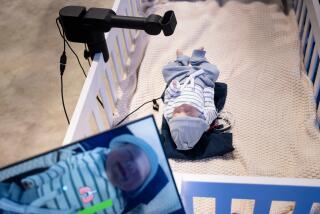TV Makers Take a Side on Anti-Piracy Technologies
- Share via
WASHINGTON — Intensifying a battle with Hollywood and broadcasters over new anti-piracy technologies, television makers have told federal regulators they are backing a new copy-protection scheme that could bring jarring changes to the way consumers watch TV.
In a three-page letter sent to Federal Communications Commission Chairman Michael K. Powell last week, the Consumer Electronics Assn. said the majority of TV makers plans to equip their digital TVs with a new technology that can block viewers from making digital copies of shows ranging from “Monday Night Football” to movies on Home Box Office.
“We believe a commonly accepted copy-protection system will be a major factor in promoting the roll-out of digital television . . . and ensuring that content providers make high-value content available,” CEA President Gary Shapiro wrote to Powell.
Some manufacturers, including Sony Corp. and Mitsubishi Group, have already begun production of the new sets, which are expected to arrive on store shelves later this year.
The technology, known as IEEE 1394, i.Link or FireWire, is a data networking standard with tough security features aimed at enticing Hollywood and broadcasters to package more content in digital form as entertainment makes the transition from today’s analog devices to new digital TV sets and Digital Video Disc.
Nearly 200 television stations in 65 markets now transmit digital TV signals during at least part of the day, according to the National Assn. of Broadcasters. And DVD players have become one of the hottest digital devices on the market--selling nearly 1.7 million units in the first 11 weeks of this year, according to CEA.
But FireWire technology might not be as effective in protecting over-the-air broadcasts as it is in protecting content on cable networks because TV signals are sent unencrypted over public airwaves. And some lawmakers have expressed concern that they want to keep it that way--fearing a consumer backlash.
As a result, FireWire’s imminent debut probably will reignite a bitter battle about how creative works are to be distributed and enjoyed in the age of the Internet and other digital technologies.
Although two major studios--Sony Pictures Entertainment and Warner Bros.--have endorsed FireWire, the others want even tougher security. They fear that without it, pirates could make perfect digital copies of all kinds of creative works, upload them onto the Internet and distribute them globally.
“We’ve watched what happened in the music world . . . and we are determined to avoid that here,” said Preston Padden, executive vice president of government relations for Walt Disney Co.
But civil liberties groups and other critics say even FireWire is overkill and will erode individuals’ home-recording rights.
The technology gives program producers, rather than consumers, the power to decide what can and cannot be copied digitally, although VCRs using today’s analog technology would still work. FireWire uses both electronic authentication and encryption to determine whether digital content should be transmitted from one device and can limit the number of times content can be copied.
To be sure, no technology is completely secure. But FireWire raises the bar for those seeking to copy protected material. Instead of just one secret encryption key that might easily be defeated, digital cable networks will have dynamic encryption that is different for every user. And publishers could use embedded digital “watermarks” and other hidden means of identifying those who try to gain access to protected material.
FireWire technology does “make it much more difficult for hackers,” said Peter Mell, a computer security expert at the National Institute of Standards and Technology. He added that watermarks are extremely difficult to find among the billions of electronic bits that constitute digital music, photos and videos.
“On the other hand,” he said, “it only takes one intelligent hacker to break the scheme, and then all of the songs and movies are out on the Internet.”
Some lawmakers say that if such copy-protection schemes become widespread, they could erode long-held legal rights--such as privacy and the fair use of copyrighted material--that consumers have enjoyed.
Rep. Rick Boucher (D-Va.) said, “I think in this Congress, we need to examine the application of fair use in the digital age to make sure these rights are not undermined.”
More to Read
The biggest entertainment stories
Get our big stories about Hollywood, film, television, music, arts, culture and more right in your inbox as soon as they publish.
You may occasionally receive promotional content from the Los Angeles Times.









